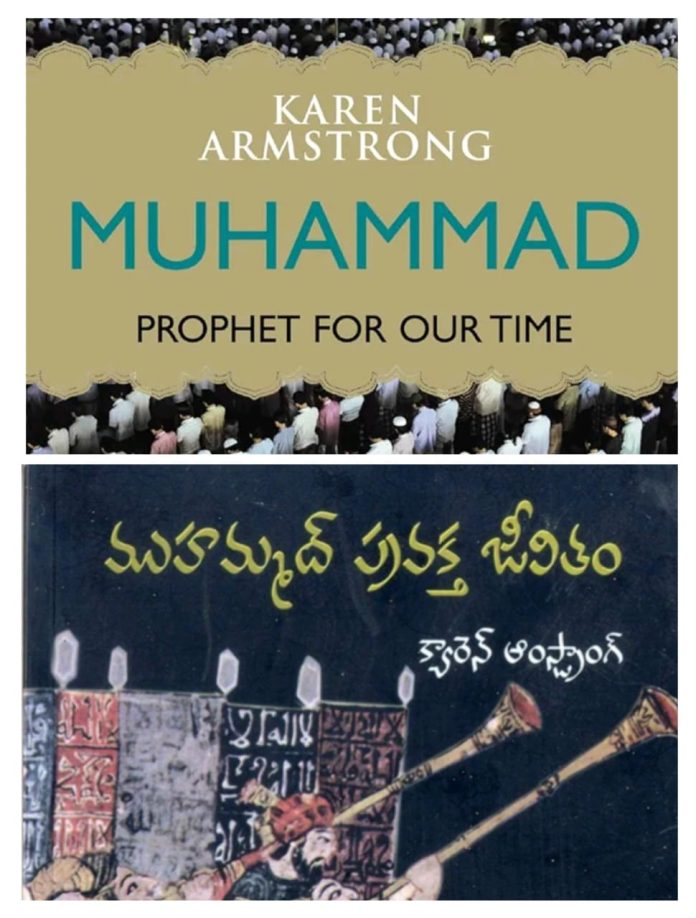Book: Mohammed Pravakta Jeevitam
[Telugu Edition of the author’s Muhammad: A Prophet for Our Time]
Author: Karen Armstrong
Telugu Translator: P. Satyavati
Publisher: Hyderabad Book Trust
Review by Rama Sundari in Telugu, translated into English by Ayesha Sultana
Published by Hyderabad Book Trust in 2010 and reprinted in 2011, “Mohammed Pravakta Jeevitam,” the Telugu version of “Muhammad: A Prophet for Our Time” by British author Karen Armstrong is a compelling exploration of the Prophet Muhammad’s ﷺ life. The original English version, released in 1991 by HarperCollins, was translated into Telugu by P. Satyavati and made available by Hyderabad Book Trust.
Armstrong wrote this book in response to the controversies surrounding Salman Rushdie’s The Satanic Verses, and it gained renewed significance following the September 11, 2001 attacks in the United States. The book addresses the growing Islamophobia of the time, making it particularly relevant in light of recent CAA protests and the spread of misinformation about Islam post-COVID-19.
Although Armstrong’s book compares Islam and Christianity, it is also relevant to Hinduism. She challenges claims that certain harsh verses in the Quran promote violence, pointing out that similar passages exist in Christian and Jewish scriptures.
In the wake of the September 11 attacks, President Bush and Prime Minister Blair visited mosques to assert that their conflict was with terrorism, not with Islam. Armstrong observes that there was a surge in interest in books about Islam during this period, including hers. She emphasizes that Islam fundamentally means ‘surrender to God’ and highlights Muhammad’s ﷺ dedication to establishing peace.
Armstrong asserts that Islam, Christianity, and Judaism all share a belief in one God and have coexisted peacefully for centuries. She notes that while Islam was once a major global force, it is now often viewed as a challenge in the West, similar to the perception of the Soviet Union during the Cold War. She also discusses the historical persecution of Jews and Muslims by Christians.
She critiques Western prejudices that have shaped negative views of Islam, referencing historical misconceptions from the 1970s and 1980s. Armstrong argues that the portrayal of Islam as a threat to freedom and creativity is misguided and emphasizes that Muhammad ﷺ should be understood as a spiritual leader who brought peace and civilization to his followers.
The book also addresses issues with Quranic translations and the absence of a divine language akin to that found in Christianity and Judaism. Armstrong clarifies that Muslims do not view Muhammad ﷺ as divine but honor him as a prophet and messenger of God.
Additionally, Armstrong explores Muhammad’s ﷺ marriages and the historical development of practices such as veiling. She acknowledges the work of early historians like Muhammad ibn Ishaq, Muhammad ibn Saad, Abu At-Talib, and Muhammad ibn Umar, who documented Muhammad’s ﷺ life and actions, including those critiqued in The Satanic Verses.
For anyone seeking a deeper understanding of Islam, Armstrong’s book is a valuable resource. It contrasts Islamic beliefs about death and suffering with Christian views, presenting Islam as a progressive religion that promotes monotheism and personal development. The Telugu translation maintains the quality of the original work, thanks to Satyavati’s skillful translation.
[Rama Sundari is POW (Progressive Organisation of Women) Leader. Karen Armstrong’s Telugu edition is available at: http://amzn.to/2XYemFL]




